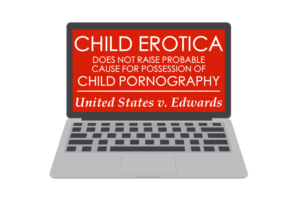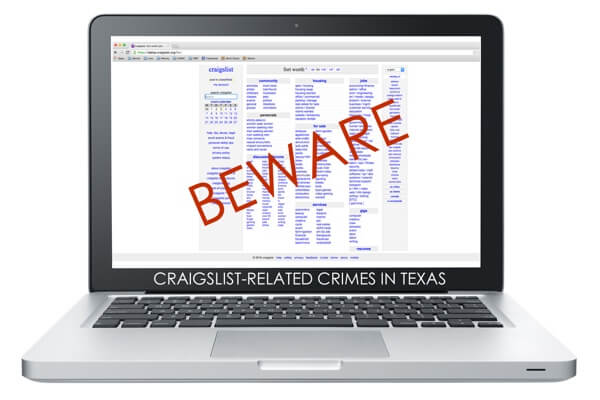10th Circuit Holds that Possession of Child Erotica Does Not Give Rise to the Likelihood of Possession of Child Pornography
 Paul Edwards was charged with possession of child pornography (which is illegal) after officers executed a search warrant based on his possession of child erotica (which is not illegal). The search of Edwards’s home resulted in the discovery of thousands of images and videos of child pornography. Edwards filed a motion to suppress the images on the grounds that the affidavit failed to prove his possession of child erotica amounted to probable cause to believe that he also possessed child pornography. The court denied this motion and Edwards entered a conditional guilty plea, reserving his right to appeal the denial, and was sentenced to 63 months in jail followed by 7 years of supervised release.
Paul Edwards was charged with possession of child pornography (which is illegal) after officers executed a search warrant based on his possession of child erotica (which is not illegal). The search of Edwards’s home resulted in the discovery of thousands of images and videos of child pornography. Edwards filed a motion to suppress the images on the grounds that the affidavit failed to prove his possession of child erotica amounted to probable cause to believe that he also possessed child pornography. The court denied this motion and Edwards entered a conditional guilty plea, reserving his right to appeal the denial, and was sentenced to 63 months in jail followed by 7 years of supervised release.
Full Court Opinion: United States v. Edwards (USCA 10th Circuit, 2015)
The Probable Cause Affidavit that Led to the Search and Arrest
Edwards was identified by agents that were investigating a website for individuals suspected of child exploitation as an internet user that had shared 715 images of the same prepubescent girl, approximately 10 years old. In some of the photos the girl was clothed and in others she was “scantily clad.” The government acknowledged that the agents did not observe Edwards posting or viewing child pornography. Instead, the affidavit described the photos as child erotica and only provided evidence that Edwards possessed legal child erotica. The officer explained in the affidavit that those who collect child pornography are likely to collect child erotica but made no distinction that a possessor of child erotica is highly likely to also possess child porn. This opinion was used by the magistrate in issuing the warrant and again by the trial court in denying Edwards’s motion to suppress.
The Legal Significance: Child Erotica vs. Child Pornography
While it is legal to possess child erotica, it is illegal to possess child pornography. Here, child erotica is defined in the affidavit as “materials or items that are sexually arousing to persons having a sexual interest in minors but that are not, in and of themselves, obscene or that do not necessarily depict minors in sexually explicit poses or positions.” The affidavit further explains that child erotica “includes things such as fantasy writings, letters, diaries, books, sexual aids, souvenirs, toys, costumes, drawings, cartoons and non-sexually explicit visual images.”
Child pornography is any visual depiction, whether authentic or computer generated, of a minor engaging in sexually explicit conduct. 18 U.S.C. §2256(8). To cross the line from legal child erotica to prohibited child pornography, there must be nudity that displays the genital area of the child and that display must also be lascivious. United States v. Horn, 187 F.3d 781. A photo is lascivious if it focuses on the genital area of a child and the apparent purpose of the photo is to arouse sexual desire. United States v. Kemmerling, 285 F3d 644.
Participation in Legal Conduct Does Not Prove Participation in Criminal Conduct
In many situations courts are hesitant to presume that defendants are more likely to engage in certain illegal activities based on their participation in a certain legal activity, as they should be. Similarly, here, the appellate court found that there is no sufficient connection between the posting of child erotica, a legal activity, and the possession of child porn that establishes probable cause to believe that child porn will be found in the home of the person who posted child erotica.
While some courts have found that the possession of child erotica is one factor that can be used to support probable cause of the possession of child porn, no court has found that one factor to be probative in making a probable cause determination. Instead, the courts look to the totality of the circumstances surrounding defendant’s said possession of child erotica to prove that such circumstances amount to the high probability that defendant is also in possession of child pornography.
The appellate court found that the affidavit lacked information based on the officer’s experience about the type of materials possessors of child erotica are highly likely to maintain and lacks any evidence to show that Edwards was a collector of child pornography. Further, the court determined that the information in the affidavit failed to provide a “substantial basis” to find probable cause that child porn would be found in Edward’s home.
Ultimately, this case is the perfect example that mere possession of child erotica cannot be used to prove that a defendant has committed the offense of possession of child pornography.









